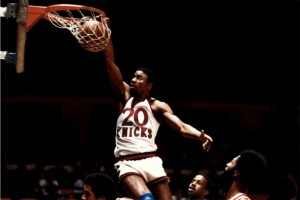 Clearly Lamar Odom isn’t the first NBA player to have an addiction to cocaine. He probably won’t be the last either. That said, there was an interesting story out of the New York Post this weekend, claiming to have sources with the Federal Bureau of Investigation who provided details of a case in the 1980’s opened because of suspicions that three New York Knicks players were shaving points and fixing games they played in to give an edge to their gambling addicted drug dealer. There is no way in today’s TMZ-centric world wide web, this would have stayed quiet like it did in the ’80’s:
Clearly Lamar Odom isn’t the first NBA player to have an addiction to cocaine. He probably won’t be the last either. That said, there was an interesting story out of the New York Post this weekend, claiming to have sources with the Federal Bureau of Investigation who provided details of a case in the 1980’s opened because of suspicions that three New York Knicks players were shaving points and fixing games they played in to give an edge to their gambling addicted drug dealer. There is no way in today’s TMZ-centric world wide web, this would have stayed quiet like it did in the ’80’s:
Coked-up Knicks players fixed games as a favor to their drug dealer — who bet big bucks against the anemic New York squad, FBI informants claimed during the 1981-82 season.
The feds probed whether three Knicks, reportedly “heavy users of cocaine,” and their supplier, “one of the largest dealers on the East Coast,” shaved points, according to FBI documents cited in Brian Tuohy’s book, “Larceny Games: Sports Gambling, Game Fixing and the FBI.”
The dealer was a degenerate gambler who usually bet $300 a game, informants told investigators, but in January 1982 he began laying $10,000 wagers on Knicks’ opponents — and winning them.
But even more interesting, was that not only were the players fixing games for their dealer, but the trio themselves started attempting to profit off of bets on their own games. They must have gotten quite comfortable with their routine, because that is simply playing with fire:
At the same time, FBI moles began to suspect the Knick trio were “betting against themselves.”
In November, an informant told the feds one of the schemers owed a “large .?.?. gambling debt” to a Luchese crime-family bookie.
“So many people say it’s impossible to fix a game because guys are paid so much money,” Tuohy told The Post. “But you can see how easily they can get hooked on some drug, be gambling themselves and get in deep with a bookie.”
A point-shaving hoopster could tank his performance to make the final score closer than it should be, helping those who bet the underdog. Or, a crooked player could make mistakes to inflate the margin of defeat, aiding a favorite-bettor.


















